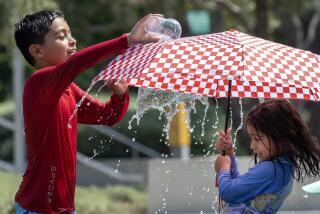Health Expert Says 10,000 Could Perish in Heat Wave
- Share via
CHICAGO — A killer heat wave continued to fry the Midwest on Tuesday with languid, enervating 100-degree temperatures that one environmental expert said may claim thousands of victims by the end of summer.
“Certainly more than 10,000 deaths,” was the prediction of W. Moulton Avery, executive director of the Washington-based Center for Environmental Physiology and an expert on heat-related ailments. “And it wouldn’t surprise me if it exceeded the number of deaths in 1980.”
The National Center for Health Statistics reported 15,000 heat-related deaths that year when persistent hot weather smothered much of the Midwest and Northeast.
In metropolitan Chicago alone, the heat has been blamed for two deaths a day--every day--so far this month.
“The highest mortality is among people who have underlying diseases like cardiac patients, those with emphysema or alcoholics,” said Dr. Cai Glushak, a University of Chicago hospital emergency room physician. Also at risk are infants and the elderly.
But others also can be in danger. In the last month two New York men, one 23 and one 24, died of heat stroke while running in corporate challenge races.
“Our call volume probably reached record levels in the last three or four days,” said Suzanne Halpin, acting vice president of New York City’s Emergency Medical Services.
Avery said the death rate from heat-related maladies this summer is likely to be higher than it was during 1980 because the nation’s elderly population is larger now and because this summer’s oppressive weather has been especially severe in urban areas with their big concentrations of population. Avery also said that this summer’s heat promises to last longer and cover a bigger area of the country than the hot weather in 1980.
“We have a national disaster in progress that is of equal or greater magnitude than 1980,” he said.
Tuesday’s temperature in downtown Chicago steamed to a stifling 104 degrees. The heat index--a combination of how the heat and humidity feel on the skin, the summer equivalent of winter’s wind-chill factor--reached 111 degrees. In St. Louis the temperature hit 102 degrees and the heat index edged near 115 degrees. It was 103 degrees in Des Moines, and 102 in Madison, Wis., Indianapolis and Paducah, Ky., where the heat index hit 115 degrees.
One measure of the heat this summer is cumulative. In Chicago, for example, if you add all the days when the temperature hit 90 degrees or more, they would total 45--more than six weeks--since late May. Seven of those days were 100 degrees or warmer--more days over the century mark than have ever been recorded in one summer in the Windy City.
At noon Tuesday in Chicago it was so hot--and so difficult to breath--that downtown workers apparently stayed in air-conditioned offices or crowded into cool department stores. Popular restaurants had tables available. Sidewalks on hazy Michigan Avenue, the city’s main drag, were about as deserted as they are on blustery winter days when the temperature is 10 degrees below zero--114 degrees colder than it was Tuesday. But Marshall Field, the city’s biggest department store, reported noon-time crowds of shoppers.
Tourists also were staying off the streets of Washington, D.C, where the temperature moderated Tuesday to 93 degrees--10 degrees cooler than it was there on Monday.
“A lot of people are going indoors to beat the heat,” said Tom Murphy, manager of tourism promotion for the Washington Convention and Visitor Assn.
Pet Owners Warned
At midday the pavement in Chicago was so hot that the Anti-Cruelty Society warned pet owners that walking their dogs would result in burned paws.
“A dog’s paw is like skin and it burns,” said Jane Stern, the society’s director of development.
The heat, which already has combined with dry weather to devastate the nation’s agricultural economy this year, is now inflicting damage on the Midwest’s manufacturing economy. Steel plants and auto factories are reporting lower production this week because of the weather.
At the Indiana State Fair, which opened Tuesday, livestock exhibitors put ice in front of large fans to keep their hogs, cattle, poultry and rabbits cool.
In South Dakota, ranchers were warned not to transport their livestock to slaughter or to feed lots until temperatures moderated. And at the National Zoo in the nation’s capital, sprinklers were installed in several animal pens to give the wild animals relief from the heat.
But the keeper of the Chicago Bears was not as considerate. Even though temperatures at the football team’s training camp in Platteville, Wis., hit 103 degrees Tuesday, tempers were hotter. Coach Mike Ditka had his team running wind sprints and complained about sluggish performances.
Blame it on the season. The heat causes an increase in fatigue and irritability, explained Richard Glass, a professor of psychiatry at the University of Chicago Medical School.
“Heat can affect levels of energy and irritability in a person,” Glass said. “It is difficult for people to get motivated because of a sense of lethargy. People are more likely to snap because heat causes people to argue more quickly.”
“We don’t have any hard statistics but a gut feeling tells me incidents are up,” said a spokesman for the Chicago Police Department with 18 years of patrol experience. “Domestic (arguments) are up, landlord-tenant disputes are up. There are overheated tempers.”
And they are likely to stay overheated for a while. The long-range forecast for the Midwest calls for above normal temperatures into September and below normal rainfall.
This week’s hot weather in the region is being caused by high pressure in the upper atmosphere over the Mississippi Valley, said WeatherData’s Mike Smith, a consultant to The Times.
“High pressure of that type causes air to sink. It warms by compression and when the air warms up, humidity decreases, keeping clouds from forming,” Smith said.
A second high pressure air mass parked stubbornly over the Southeast was being blamed for the heat wave gripping the mid-Atlantic and New England states, said Bob Oszajca, a National Weather Service forecaster in Washington.
Utilities Report Records
Again Tuesday, as they have done throughout the summer, utilities in the Midwest reported new records for electricity use while temperatures that moderated temporarily in the Northeast gave power companies a breather after several days of brownouts and total power failures.
In Poughkeepsie, N.Y., the heat was a joke to the city council. They passed a resolution this week forbidding anyone from reporting a temperature of more than 89.5 degrees. So far this year the northern New York college town has had 29 days of 90-degree temperatures.
Larry Green reported from Chicago and Mark Lawrence reported from Washington. Researchers Eileen V. Quigley in New York and Rhonda Bergman in Chicago also contributed to this story.
More to Read
Sign up for Essential California
The most important California stories and recommendations in your inbox every morning.
You may occasionally receive promotional content from the Los Angeles Times.













